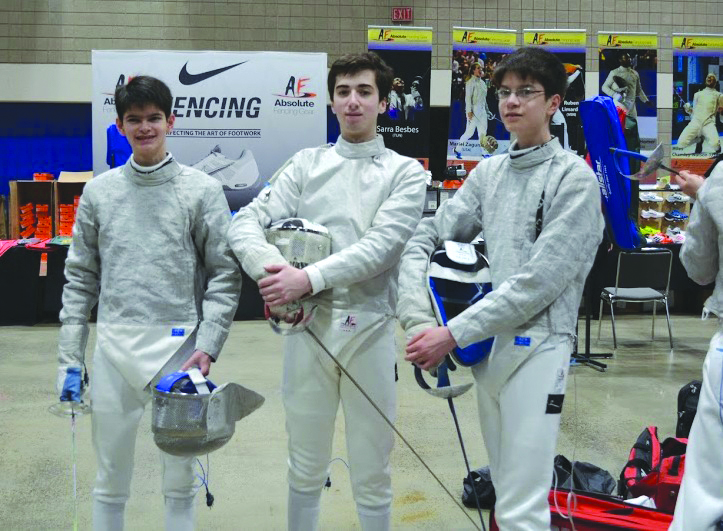Three Ashland athletes were part of the Zeta Fencing Team that participated in the 2017 Junior Olympics in Kansas City, Missouri, over four days in February. Cameron Sherr, Jonathan and Nicholas Conroy, and 94 Massachusetts fencers from 14 different clubs throughout the state made the trip to show off their fencing skills at the Kansas City Convention Hall.
Under the guidance of their coaches Dimo Boyko and Zoran Tulum, the three Ashland athletes performed admirably in their first-ever Junior Olympics. Nicholas Conroy grabbed an 81st place finish among 237 participants in the Junior (under 20) category while also taking home a 107th place finish in the Cadet (under 17) category, where 226 fencers participated. Jonathan Conroy was 91st and Sherr was 141st in the Cadet group, where all three Ashland fencers fought in saber fencing.
“While these results don’t look impressive by themselves, you must keep in mind that these are the National Championships and all fencers had to qualify to compete there,” Eva Heinrich, Executive Director of Zeta Fencing, said.”
Zeta Fencing qualified the most saber fencers from the state of Massachusetts for the competition in Kansas City. While other clubs have foil or epee fencers, Zeta specializes in on one fencing discipline – saber. The saber is a light cutting and thrusting weapon that targets the body above the waist except the weapon hand.
Contestants wear leme jackets and a mask that are electrified to show hits during competition, but the ultimate point-scoring falls to the referees. Competitions usually consist of two rounds; the first is pool play where 5 touches gets the win; the second round has participants seeded through the results of their pool play wins as well as touches for and against. In the second round, participants look to record 15 touches first for the win in a direct elimination.
All three Ashland residents came across fencing in somewhat of a similar way – by process of elimination.
“I had previously tried other sports and never found one that I liked,” Jonathan Conroy said. “I first came across fencing at summer camp, and I’ve stuck with it. You have to think tactically as well as perform physically.”
Conroy’s twin brother Nicholas agreed. “We had played around with plastic swords as kids, so when we saw the activity being offered at camp, we decided to try it out,” he said. “We had a mini tournament at the end of camp, and I won so I decided to continue with it. There’s a mental aspect of the sport where you have to outthink your opponent that I like; you’ve got to try and figure out what they’re planning to do ahead of time.”
Sherr also came across the sport of fencing much the same way Jonathan Conroy came about it, although it was actually his parents that found Zeta Fencing in Natick.
“I got involved in fencing mostly because I was bad at just about every sport that I had tried. I tend to rely on myself, and fencing gave me a feeling of accomplishment,” Sherr said. “When I was nine years old, my mother saw an article on the Zeta Fencing Club and thought it would be a good idea to try; I figured why not—what nine year old doesn’t like welding a weapon.”
As Heinrich alluded to the finishes for the Ashland trio were not all that bad and the boys also thought that their performances in their first visit to the Junior Olympics didn’t go all that bad.
“Overall I was disappointed in my results (91st) although I did finish in the upper half of the group,” Jonathan said. “In the direct elimination I feel that I fenced stupidly and that resulted in my loss. I do want to qualify again next year and perform at a higher level.”
His brother, who was able to qualify and compete in two different tournaments, was happy with his performance in Juniors but thought that he could have done better in his Cadet competition. He, too, wants to qualify once again next year to improve upon his scores.
Sherr, a sophomore at Ashland High School, had a lot of emotions running through his mind during his performance, but wouldn’t give it up for anything. “Being that this was my first Junior Olympics I was excited and nervous at the same time because of the size of the tournament,” he said. “I felt great during my performance and did fine. I would like to continue to qualify. Fencing is physical chess in terms of movement thinking, and I have learned a lot of self reliability though it.”
Although the Junior Olympics have concluded, the trio will now go back to practicing four nights a week and Sunday mornings through the month of June in hopes of earning a spot in the U.S. Nationals come July.

Issue Date:
April, 2017
Article Body:
Column:
